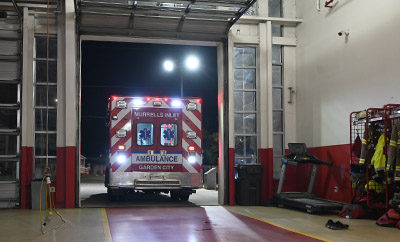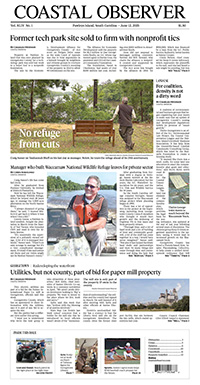Murrells Inlet
Inlet fire district seeks phased-in tax increase from voters

Voters will be asked in July to double the tax rate for the Murrells Inlet-Garden City Fire District over the next five years. The district board, which voted earlier this month to hold a referendum, this week decided to ask for an increase from 14 to 28 mills that will be phased in.
The board received a key vote in support of the proposal, which will allow the district to add a fourth ambulance, increase pay to help attract and retain staff, and double the number of first responders on each shift.
“It’s pretty clear there’s not enough money,” said Tom Swatzel, a former Georgetown County Council member who created the Friends of the Murrells Inlet-Garden City Fire District to support the 2015 referendum that raised the tax rate from 10 to 14 mills.
Swatzel, through the Friends, also opposed a 2019 referendum that would have raised the tax rate to 19 mills. It was defeated by a wide margin. This time, he told the district board he will support their effort.
The district commissioned a study last year from a Tennessee-based consulting firm that found that more than 200 times a year the district doesn’t have an ambulance available to answer calls because its three medical units had already dispatched, a condition known as Level Zero. The district had to rely on mutual aid agreements with neighboring departments for help.
Of the 8,200 calls the district answered last year, 70 percent were for medical issues.
The study also showed the impact on the district of a nationwide shortage of firefighters and emergency medical workers. Current employees either have to work overtime or the district has to reduce staff on each shift, which is supposed to be 18 employees, but has dropped as low as 13 this year.
The proposed tax increase will allow the district to have 30 people on each 24-hour shift. That would meet the national staffing standard for dealing with structure fires.
The district is a state special purpose district that covers portions of Georgetown and Horry counties. Its tax rate can only be increased through a referendum.
The board agreed this week to a ballot question that would seek approval for a 7-mill tax increase this year and allow up to 7 additional mills to be added to cover the cost of additional personnel.
A mill of property tax equals $1 in tax for every $1,000 of assessed value. For an owner-occupied home valued at $100,000, that would be $4. For a $100,000 commercial property, that would be $6.
The board will ask the election commissions in the two counties to schedule the referendum so the result, if successful, can be factored into the tax bill that the counties send out in the fall.
The immediate increase to 21 mills will allow the district to add a fourth ambulance and increase pay, Fire Chief J.R. Haney said.
“Then we could look at the fire-suppression side,” he told the six-member board.
Board member Beth Ward, the treasurer, said the phased approach would be more realistic because the district won’t be able to hire the 50 additional staff recommended by the consultant all at once.
After the initial increase, “we wouldn’t impose the 7 mills unless we had the staff,” said Gene Connell, who chairs the board.
He thought it was important to let voters know that the tax increase and staffing proposal were part of a five-year plan. “We need to be able to tall them we’re not going to come back next year and ask for another 10 mills,” he said.
“I want to be as transparent with the public as possible,” Ward said. “That is what has hurt us” in the 2019 vote.
Before voting, the board asked Swatzel, who is also a political consultant, if he thought voters would back the referendum.
“Tom knows as much about the political environment as anybody,” Connell said.
It’s difficult talk about doubling taxes, Swatzel said. But he added that the numbers about Level Zero ambulance service “are kind of scary numbers.”
After reading the consultant’s report, Swatzel said he was also struck by the fact that half the calls for service overlap.
“Those two things certainly caught my attention,” he said.
The fire district board waited until this week to set the tax rate in the referendum so it could receive an audit of its budget for calendar year 2022. The failure of the 2019 vote was tied to concerns about the district’s financial management. It had gone four years without an audit.
Swatzel said the audit confirmed the district’s need for additional operating revenue. “They’ve been awash in impact fees with the building, but those can only be used for limited purposes,” he said.
The money for salaries and operations comes from property taxes and charges collected – mainly from insurance – for ambulance services. Last year, the district took in $4.9 million in property taxes and $1.4 million for ambulance charges.
The district received $2.2 million in impact fees on new construction, which is used for capital expenses. The district also paid off $1.5 million in outstanding debt, “which is good,” Swatzel noted.
The growth that is driving the need for expanded fire and rescue service is also showing up in the voter rolls. There are now 27,000 registered voters in the district, Swatzel said, 4,000 more than in 2019.
The fire district can’t use public funds to campaign for passage of the referendum, but it can provide the public with information about its needs and the reason for the referendum.
Employees can campaign when they are off duty.
The Friends can use private funds to support the effort. Swatzel said he will be volunteering his services.
Even with the defeat of a tax increase in 2019, which he called “tough love,” Swatzel said “I believe most voters and residents of the fire district have a lot of goodwill toward the district and the first responders.”




